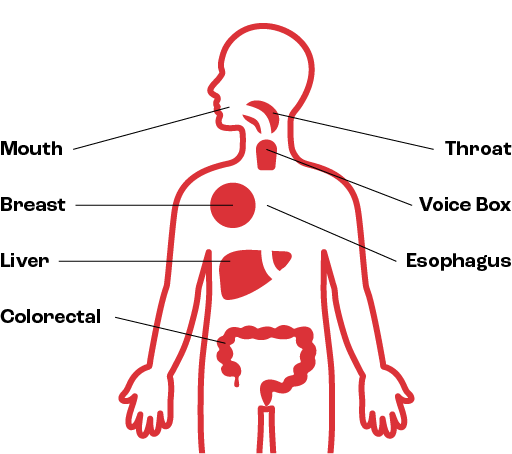How does alcohol increase the risk of cancer?
Drinking alcohol can increase the risk of cancer in a few ways.[5] All alcoholic drinks contain something called ethanol, which can damage the cells in our body over time. Alcohol can also affect hormones in our body, which can make the risk of breast cancer go up. If someone smokes and drinks, the alcohol can allow the cancer-causing toxins from smoking to get into the body more easily.
How can I reduce my risk of cancer from alcohol use?
The Canadian Cancer Society says that cutting down on alcohol is one of the top 10 things you can do to lower your chances of getting cancer.[7] It’s best not to drink alcohol at all if you want to prevent cancer. If you decide to drink, drinking less can be better for your health and can lower your cancer risk.
You can start by keeping track of how much you drink in a week and try to drink less to reduce your risk.
Are there health benefits to drinking alcohol?
Recent research tells us that drinking alcohol doesn’t have any good effects on our health. In addition to cancer, alcohol use can also make us more likely to have conditions like liver disease, heart disease and stroke.[1]
Drinking by the numbers
If you choose to drink, Canada’s new Guidance on Alcohol and Health has an easy way to figure out how risky drinking alcohol can be for your health:
- Drinking 1-2 standard drinks per week is low risk
- 3-6 standard drinks is moderate risk
- 7 or more standard drinks per week is increasingly high risk
The main idea is that drinking less is healthier. Every little step you take to drink less can make a difference.
Adapted with permission from the Canadian Centre on Substance Use and Addiction
Click here to find resources to help you get started on your journey.

What is a standard drink?
A standard drink means:

Beer
341 ml (12oz) of beer
5% alcohol

Cooler, cider,
ready-to-drink
341 ml (12oz) of drinks
5% alcohol

Wine
142 ml (5oz) of wine
12% alcohol

Spirits
(whisky, vodka, gin, etc.)
43 ml (1.5oz) of spirits
40% alcohol

Want to know more about alcohol and cancer risk?
References
- Paradis, C., Butt, P., Shield, K., Poole, N., Wells, S., Naimi, T., Sherk, A., & the Low-Risk Alcohol Drinking Guidelines Scientific Expert Panels. (2023). Canada’s Guidance on Alcohol and Health: Final Report. Ottawa, Ont.: Canadian Centre on Substance Use and Addiction.
- International Agency for Research on Cancer. IARC monographs on the evaluation of carcinogenic risks to humans. Volume 100E. A review of human carcinogens. Part E: Personal habits and indoor combustions. Lyon, FR: International Agency for Research on Cancer; 2012
- World Cancer Research Fund / American Institute for Cancer Research. (2018). Continuous Update Project Expert Report 2018. Alcoholic drinks and the risk of cancer.
- Rumgay, H., Shield, K., Charvat, H., Ferrari, P., Sornpaisarn, B., Obot, I., et al. (2021) Global burden of cancer in 2020 attributable to alcohol consumption: a population-based study. Lancet Oncology 22(8), P1071-1080.
- BC Cancer (2023) Alcohol and cancer: Frequently Asked Questions.
- Rumgay, H., Shield, K., Charvat, H., Ferrari, P., Sornpaisarn, B., Obot, I., et al. (2021) Global burden of cancer in 2020 attributable to alcohol consumption: a population-based study. Lancet Oncology 22(8), P1071-1080, Supplementary appendix p24.
- Canadian Cancer Society. (2019). 10 ways to reduce your cancer risk.

